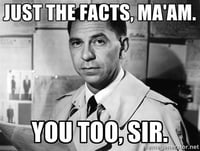 Anyone old enough to remember the television series “Dragnet” no doubt remembers the title of today’s post as Jack Friday’s famous catch phrase. Only it wasn’t. He never uttered those exact words in any episode, although he commonly said, “All we want [or “know”] are the facts, ma’am.” Nor was his name Jack Friday. It was Joe Friday, played by Jack Webb.
Anyone old enough to remember the television series “Dragnet” no doubt remembers the title of today’s post as Jack Friday’s famous catch phrase. Only it wasn’t. He never uttered those exact words in any episode, although he commonly said, “All we want [or “know”] are the facts, ma’am.” Nor was his name Jack Friday. It was Joe Friday, played by Jack Webb.
Verifying the accuracy of names, dates, quoted material, product claims, statistics, allegations and the like is (or should be) part of every writer’s due diligence before publishing, and most professional writers take this fact-checking responsibility seriously. But even conscientious writers can make cringeworthy gaffes by failing to double-check the little things or to confirm what they think they know.
Assume Nothing
You know the maxim about what happens when you assume? Keep that in mind when reviewing your (or anyone else’s) documents for accuracy before giving them the green light.
In my first year of college (many moons ago), my English professor returned a paper to me, lauding my “formidable analysis” but questioning whether, in one place, I’d meant to say “eschew.” No, no I hadn’t. “Espouse” was the word I’d wanted. Similarly, a document we reviewed recently at ProofreadNOW.com contained this sentence: “Teamwork will help employees develop more skills themselves and more apathy [read: empathy] toward each other.”
If you’re going to use words you’re unsure about, look them up. Even if you’re 99 percent certain you’ve used the right word and spelled it correctly, erase the 1 percent of doubt by consulting a dictionary. Believe me, it’s time well spent.
Another common mistake is confusing the meanings of similar holidays, as in this sentence from a document that came in last week: “[Company name] celebrates Labor Day by honoring veterans every day.” (Actually, Labor Day honors all working people; Veterans Day honors military veterans and war victims; Memorial Day honors those who died in active military service.) Taking a minute to search “Labor Day meaning” online would have prevented the error.
We Don’t Fact Check, But …
Fact checking is undoubtedly important, especially if you don’t want to end up on a year-end list of worst media blunders (although writing the corrections would, I think, be great fun). Because the writer is in the best position to verify what he or she writes about, we don’t offer fact checking per se as part of ProofreadNOW.com’s services.
But we DO look for and correct the kinds of potentially embarrassing errors noted above — those “general knowledge” or obvious errors that writers can make (and editors can sometimes overlook) by taking what they know for granted. So, in addition to checking a calendar to confirm days and dates match and confirming URLs and links are valid, we’ve verified and queried or corrected errors such as the following:
- “Caesar’s Palace” to “Caesars Palace” (no apostrophe)
- “Society of Cardiovascular Anesthetists” to “Society of Cardiovascular Anesthesiologists”
- “Greg Abbot” (Texas governor) to “Greg Abbott”
- “Kevin Brady” (in a reference to a Pennsylvania U.S. representative) to “Robert Brady”
- “Montana” (in a reference to the least populated state) to “Wyoming”
If the information is likely widely known by the intended audience and can be easily confirmed with a quick online search, we’ll check it and, if necessary, correct it. If a statement seems off or can’t be easily verified, we’ll query it. But because our editors aren’t subject matter experts in the wide array of material we see, we rely on our clients to be on the front line of fact checking … just like Joe Friday.
We’d love to hear about some of the most memorable fact-checking slipups you’ve seen in print. Please share in the comments below.




